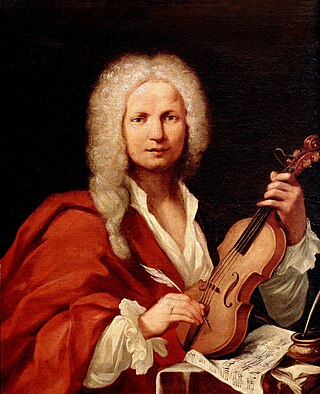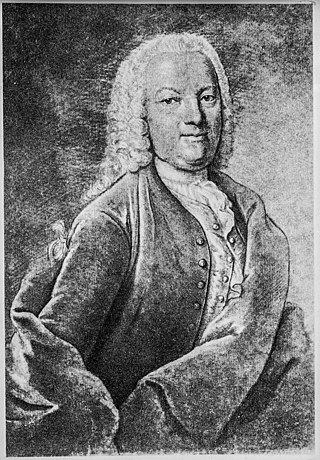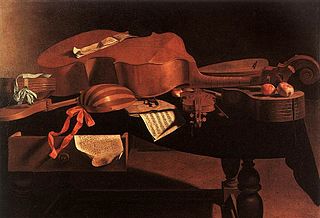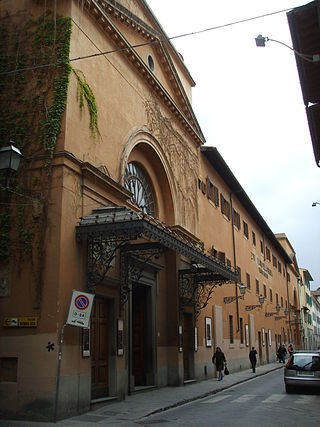Related Research Articles

Antonio Lucio Vivaldi was an Italian composer, virtuoso violinist and impresario of Baroque music. Along with Johann Sebastian Bach and George Frideric Handel, Vivaldi ranks amongst the greatest Baroque composers and his influence during his lifetime was widespread across Europe, giving origin to many imitators and admirers. He pioneered many developments in orchestration, violin technique and programmatic music. He consolidated the emerging concerto form into a widely accepted and followed idiom.

Tomaso Giovanni Albinoni was an Italian composer of the Baroque era. His output includes operas, concertos, sonatas for one to six instruments, sinfonias, and solo cantatas. While famous in his day as an opera composer, he is known today for his instrumental music, especially his concertos. He is best remembered today for a work called "Adagio in G minor", attributed to him but largely written by Remo Giazotto, a 20th century musicologist and composer, who was a cataloger of the works of Albinoni.

Benedetto Giacomo Marcello was an Italian composer, writer, advocate, magistrate, and teacher.
The trio sonata is a genre, typically consisting of several movements, with two melody instruments and basso continuo. It originated in the early 17th century and was a favorite chamber ensemble combination in the Baroque era.

Alessandro Ignazio Marcello was an Italian nobleman and composer.
Remo Giazotto was an Italian musicologist, music critic, and composer, mostly known through his systematic catalogue of the works of Tomaso Albinoni. He wrote biographies of Albinoni and other composers, including Antonio Vivaldi.

Baldassare Galuppi was a Venetian composer, born on the island of Burano in the Venetian Republic. He belonged to a generation of composers, including Johann Adolph Hasse, Giovanni Battista Sammartini, and C. P. E. Bach, whose works are emblematic of the prevailing galant music that developed in Europe throughout the 18th century. He achieved international success, spending periods of his career in Vienna, London and Saint Petersburg, but his main base remained Venice, where he held a succession of leading appointments.
A ritornello is a recurring passage in Renaissance music and Baroque music for orchestra or chorus.

Johann Georg Pisendel was a German Baroque violinist and composer who, for many years, led the Court Orchestra in Dresden as concertmaster, then the finest instrumental ensemble in Europe. He was the leading violinist of his time, and composers such as Tomaso Albinoni, Georg Philipp Telemann and Antonio Vivaldi all dedicated violin compositions to him.
The year 1703 in music involved some significant events.

L'estro armonico, Op. 3, is a set of 12 concertos for string instruments by Italian composer Antonio Vivaldi, first published in Amsterdam in 1711. Vivaldi's Twelve Trio Sonatas, Op. 1, and Twelve Violin Sonatas, Op. 2, only contained sonatas, thus L'estro armonico was his first collection of concertos appearing in print. It was also the first time he chose a foreign publisher, Estienne Roger, instead of an Italian. Each concerto was printed in eight parts: four violins, two violas, cello and continuo. The continuo part was printed as a figured bass for violone and harpsichord.

Argippo is an opera libretto by Domenico Lalli, which in Giovanni Porta's setting premiered in Venice in 1717. Claudio Nicola Stampa's reworked version of the libretto was set as L'Argippo by Andrea Stefano Fiorè. This opera was performed in Milan in 1722.

Griselda is a dramma per musica in three acts that was composed by Antonio Vivaldi. The opera uses a revised version of the 1701 Italian libretto by Apostolo Zeno that was based on Giovanni Boccaccio's The Decameron. The celebrated Venetian playwright Carlo Goldoni was hired to adapt the libretto for Vivaldi. The opera was first performed in Venice at the Teatro San Samuele on 18 May 1735.

Baroque music refers to the period or dominant style of Western classical music composed from about 1600 to 1750. The Baroque style followed the Renaissance period, and was followed in turn by the Classical period after a short transition. The Baroque period is divided into three major phases: early, middle, and late. Overlapping in time, they are conventionally dated from 1580 to 1650, from 1630 to 1700, and from 1680 to 1750. Baroque music forms a major portion of the "classical music" canon, and is widely studied, performed, and listened to. The term "baroque" comes from the Portuguese word barroco, meaning "misshapen pearl". The works of Antonio Vivaldi, George Frideric Handel and Johann Sebastian Bach are considered the pinnacle of the Baroque period. Other key composers of the Baroque era include Claudio Monteverdi, Domenico Scarlatti, Alessandro Scarlatti, Alessandro Stradella, Tomaso Albinoni, Johann Pachelbel, Henry Purcell, Georg Philipp Telemann, Jean-Baptiste Lully, Jean-Philippe Rameau, Marc-Antoine Charpentier, Arcangelo Corelli, François Couperin, Johann Hermann Schein, Heinrich Schütz, Samuel Scheidt, Dieterich Buxtehude, Gaspar Sanz, José de Nebra, Antonio Soler, Carlos Seixas, Adam Jarzębski and others, with Giovanni Battista Pergolesi being the most prominent Baroque composer of sacred music.

Antonio Salvi was an Italian physician, court poet and librettist, active mainly in Florence, Italy. He was in the service of the grand-ducal court of Tuscany and the favourite librettist of Prince Ferdinando de' Medici. Salvi was one of the developers of the opera seria.
Antonio Maria Montanari was an Italian violinist and composer of the Baroque period.

Sebastiano Biancardi, known by the pseudonym Domenico Lalli, was an Italian poet and librettist. Amongst the many libretti he produced, largely for the opera houses of Venice, were those for Vivaldi's Ottone in villa and Alessandro Scarlatti's Tigrane. A member of the Accademia degli Arcadi, he also wrote under his arcadian name "Ortanio". Lalli was born and raised in Naples as the adopted son of Fulvio Caracciolo but fled the city after being implicated in a bank fraud. After two years wandering about Italy in the company of Emanuele d'Astorga, he settled in Venice in 1710 and worked as the "house poet" of the Grimani family's theatres for the rest of his career. In addition to his stage works, Lalli published several volumes of poetry and a collection of biographies of the kings of Naples. He died in Venice at the age of 62.
Scaramuccia is an early music ensemble founded in February 2013 on the initiative of Spanish violinist and musicologist Javier Lupiáñez.
The concerto transcriptions of Johann Sebastian Bach date from his second period at the court in Weimar (1708–1717). Bach transcribed for organ and harpsichord a number of Italian and Italianate concertos, mainly by Antonio Vivaldi, but with others by Alessandro Marcello, Benedetto Marcello, Georg Philipp Telemann and the musically talented Prince Johann Ernst of Saxe-Weimar. It is thought that most of the transcriptions were probably made in 1713–1714. Their publication by C.F. Peters in the 1850s and by Breitkopf & Härtel in the 1890s played a decisive role in the Vivaldi revival of the twentieth century.
Lodovico Fuga (1643-1722) was an Italian Baroque composer and organist, mainly active in Venice, where he was a cantor at St Mark's Basilica. In 1680 he succeeded Gasparo Sartorio as organist at San Rocco, Venice, a post he held until his death and where he gained a pay raise to thirty-six ducats a year in 1692. Oral tradition says that in 1682 Antonio Lotti became one of his pupils, although there is no documentary evidence. He may also have played a part in training Antonio Vivaldi.
References
- ↑ Curriculum Vitae of Emeritus Professor Michael Talbot, FBA
- ↑ "Talbot, Prof. Michael Owen", Who's Who (online edition, Oxford University Press, December 2017). Retrieved 19 June 2018.
- ↑ "The knives are out over the authenticity of an opera..." London: The Daily Telegraph. 23 November 2004. Retrieved 8 September 2009.
- ↑ "Lost Handel set for modern debut". BBC. 12 March 2001. Retrieved 8 September 2009.
- ↑ Vox Saeculorum roster
- ↑ White, Michael (21 November 2004). "The Vivaldi Hunters". The New York Times . Retrieved 8 September 2009.